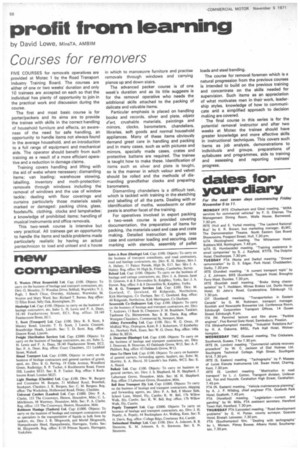profit from learning
Page 60

If you've noticed an error in this article please click here to report it so we can fix it.
by David Lowe, MInsTA, AMBIM
Courses for removers
FIVE COURSES for removals operatives are provided at Motec 1 by the Road Transport Industry Training Board. The courses are either of one or two weeks' duration and only 10 trainees are accepted on each so that the individual has plenty of opportunity to join in the practical work and discussion during the course.
The first and most basic course is for porter/packers and its aims are to provide the trainee with skills in the correct handling of household furniture and effects, an awareness of the need for safe handling, an opportunity to handle items not always found in the average household, and an introduction to a full range of equipment and mechanical aids. The operator should benefit from such training as a result of a more efficient operative and a reduction in damage claims.
Training covers handling and lifting with the aid of webs where necessary: dismantling items; van loading: warehouse stowing, labelling, inventory and moth-protection; removals through windows including the removal of windows and the use of window tackle: dealing with floor coverings and curtains particularly those materials easily marked or damaged; packing china, glass, foodstuffs, clothing, clocks and lampshades: a knowledge of prohibited items; handling of musical instruments and office removals.
This two-week course is intensive but very practical. All trainees get an opportunity to handle the items and tackle problems made particularly realistic by having an actual pantechnicon to load and unload and a house in which to manoeuvre furniture and practise removals through windows and carrying pianos up and down stairs.
The advanced packer course is of one week's duration and as its title suggests is for the removal operative who needs the additional skills attached to the packing of delicate and valuable items.
Particular emphasis is placed on handling books and records, silver and plate, objets d'art, crushable materials, paintings and mirrors, clocks, barometers, chandeliers, libraries, soft goods and normal household appliances. Many of these items obviously demand great care in handling and packing and in many cases, such as with pictures and mirrors, specially made cases, crates and protective battens are required. The trainee is taught how to make these. Identification of items such as silver and plate is taught, so is the manner in which velour and velvet should be rolled and the methods of dismantling grandfather clocks and preparing barometers.
Dismantling chandeliers is a difficult task, which is tackled with training in the sketching and labelling of all the parts. Dealing with or identification of moths, woodworm or other pests is another facet of the training.
For operatives involved in export packing a two-week course is provided covering documentation, the preparation of items for packing, the materials used and case and crate making. Detailed instruction is given into case and container loading and securing, case marking with stencils, assembly of pallet loads and steel banding.
The course for removal foremen which is a natural progression from the previous courses is intended to build on the previous training and concentrate on the skills needed for supervision. Such items as an appreciation of what motivates men in their work, leadership styles, knowledge of how to communicate and a simplified approach to decision making are covered.
The final course in this series is for the potential removal instructor and after two weeks at Motec the trainee should have greater knowledge and more effective skills in instructional techniques. This covers such items as job analysis, demonstrations to individuals and groups, preparations of syllabuses and programmes, aids to training and assessing and reporting trainees' progress.




































































































































































